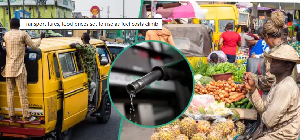The President of the Petroleum Products Retail Outlets Owners Association of Nigeria (PETROAN), Billy Gillis-Harry, has warned that higher petrol prices will lead to increased transport fares and rising costs of goods and services.
He explained that many fuel marketers are already struggling with high foreign exchange rates and distribution costs, making fuel supply difficult in some areas.
Collapse of FG's Naira-for-crude deal
The federal government did not renew the crude-for-naira deal between NNPC Limited and Dangote Refinery, leading to a possible increase in petrol prices across Nigeria starting in April.
The agreement, which lasted six months and ended in March, allowed NNPC to supply crude oil to Dangote Refinery, with payments made in naira.
This arrangement helped lower petrol prices from over N1,000 per litre to around N820, depending on location.
However, since the agreement was not renewed, Dangote Refinery recently announced it would stop selling petrol in naira to the local market.
As a result, fuel prices are rising. Reports show petrol now costs up to N960 per litre in some areas, with private depots increasing their prices to N900 per litre.
These changes, driven by higher global crude oil prices, have affected major cities, with Lagos having the lowest rates and northern states experiencing the highest increases.
PETROAN predicts costlier transportation and goods
Gillis-Harry noted that the current market situation is affecting businesses in the sector. While some marketers can afford to buy fuel in dollars, others cannot, which could make it harder to ensure a steady supply of petrol across the country.
He said that rising petrol prices would increase transport fares and the cost of other goods in the market.
He said:
"There is no doubt that the upward adjustment of petrol prices would impact on transport fares, food, clothing and other basic necessities. We need to be careful because petrol is not like other commodities. It is an important source of energy and relevant to all sectors of the economy."
Gillis-Harry emphasized that petrol should be consistently available across the country. This requires refiners to produce enough fuel, depot owners to store large quantities, and marketers to have enough distribution outlets.
He stated that PETROAN members, who operate over 7,000 retail outlets, want a more stable market. He stressed that increasing prices now is not ideal, especially as some marketers are already buying fuel in dollars.
Gillis-Harry urged the Nigerian Midstream and Downstream Petroleum Regulatory Authority (NMDPRA) to improve its oversight, ensuring fair participation for all stakeholders. He called for proper engagement to prevent any single group from dominating the market.
He also revealed that PETROAN is in talks with foreign companies to source petrol on better terms, allowing its members to buy without relying solely on dollar payments.
Business News of Monday, 31 March 2025
Source: www.legit.ng













